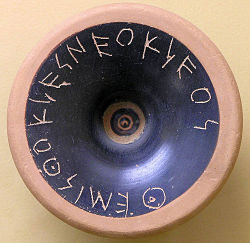14 - Making the Weaker Argument the Stronger: the Sophists
Posted on
In this episode, Peter Adamson discusses the sophists, teachers of rhetoric in ancient Athens, looking especially at the contributions of Protagoras and Gorgias.
Themes:
Further Reading
M. Bonazzi, The Sophists (Cambridge: 2020).
J.M. Dillon and T. Gergel, The Greek Sophists (London: 2003).
G.B. Kerferd, The Sophistic Movement (Cambridge: 1981).






Comments
Hey Peter great job with the
Hey Peter great job with the podcasts thank you for doing all this tedious work to help philosophy noobs like me get introduced.
I'm unclear on one part of this podcast: how does the distinction between nature and custom tie in to the defence of the Sophists saying that "the stronger SHOULD gain the better rewards in life?"
I can't quite understand that part.
In reply to Hey Peter great job with the by Gabriel
Custom vs nature
Glad you are enjoying the podcasts. Sorry, maybe the nature/custom point goes by a bit fast in the episode. What I had in mind was that for the Sophists nature provides its own set of values: from the point of view of nature, the triumph of the strponger is what "should" happen. Custom then gives us a different set of values: e.g. the weak "should" be protected from the strong. But given that this second kind of value is artificial (and perhaps only exists because the custom has been introduced by the weak for their own benefit) we might think that the first, natural kind of value is more fundamental. To put it more simply, we should dismiss the value system of custom because it is a mere convention, and embrace the natural values which are actually fixed in reality. Does that help?
In reply to Custom vs nature by Peter Adamson
But if there is some sort of
But if there is some sort of natural order of things, doesn't that mean they are saying there is an ultimate truth or reality, which contradicts what they say (about ultimate truths being non-existent) in the first place?
The way I understand the Sophists from your podcast, is that they shouldn't be allowed to use "should" at all.
And I don't see how the distinction between nature and custom defends this point.
Any ideas?
In reply to But if there is some sort of by Gabriel
More on nature vs custom
I think that you are here raising a more sophisticated objection to the nature vs custom claim, saying it is inconsistent with their relativism. I think the easiest solution here is to say that it is not necessarily the same sophists who make the nature/custom point and who make the relativism point. The former is more associated with Thrasymachus and Callicles, and mostly by Plato, though it is also found in testimony on sophists independent of Plato. The relativism idea is really Protagoras (again, Plato's version looms large). There is a family resemblance here: the nature vs custom move is a way of undermining conventional values; the relativism move is a way of undermining value claims and perhaps truth claims generally. But you are right that the first looks different from, and perhaps inconsistent with, the second. That's only going to be a problem if we find the same sophist saying both things though! (Incidentally we also find other "undermining" moves in other sophists, e.g. Gorgias with his idea that virtue is not just one thing but is different for different types of people; that undermines the notion of virtue in a way and is relativistic in a way, but it isn't Protagorean because he still accepts that a person of given type will be genuinely virtuous if they are the way people of that type should be. It's interesting to think about whether the historical Protagoras meant something more like this with his "man is the measure" idea, rather than the general epistemological view we find in Plato's Theaetetus.)
In reply to More on nature vs custom by Peter Adamson
So, general epistemological
So,
general epistemological view of Protagoras = no absolute truth, only relative
Gorgias example = relative truths existing together with an absolute/norm
Is that quite what you're saying?
Like the "undermining" explanation though. That helps alot.
In reply to So, general epistemological by Gabriel
Relative
Hi,
Yes, that's pretty much it except that I think "relative" is being used differently in the two positions. For Protagoras truth itself is realtive to each person/observer. So if X seems good to me it is good for me, however it seems to you. Whereas on the Gorgias position it is absolutely true what is good and bad, but what is good and bad depends on the person; e.g. if I'm a human it's good for me to do politics, but that wouldn't be good for a horse (or in the view ancient Athenians, for a woman). That's a different kind of relativity.
Peter
In reply to Relative by Peter Adamson
Thanks Peter. I've mostly got
Thanks Peter. I've mostly got it. :) Oh and also the podcasts are a really good way to do this. I would've never had the time to read through all of these episodes if they were in text.
Keep doing this, really appreciate it.
In reply to Relative by Peter Adamson
Generalisation
The view of Protagoras has contradictions within itself however on the other hand Gorgias view appeals to common sense and is not hard to comprehend. Like it's more like he's just stating the obvious by saying what is good for me (as a human) couldn't be/wouldn't be good for an animal. Why then do we consider both if them Sophists?
Book recommendation, if possible
Great stuff -- the entire podcast. I also liked your sketch of 5th-century Greece and Athenian history in this episode. Could you perhaps recommend a single book on (Greece history in) that century.
Please keep up the good work. Am also (much) looking forward to future episodes on Indian (and perhaps even Chinese) philosophy.
Make more videos on protagoras
I'm doing a paper on Protagoras and I cannot find any information anywhere, it is really hard and I'm getting really mad. I heard about this website, and I came here for help, but like every other website, it gives me nothing, please do more videos on those philosophers who arne't that famous. Not to be a hater, BUT COME ON, YOU GUYS NEED TO STEP IT UP!!!!!!
In reply to Make more videos on protagoras by Jason Connors
Protagoras
But this episode does have a pretty detailed discussion of Protagoras in it, doesn't it? You might also listen to the one on Plato's Theatetus which discusses Plato's response to him.
In reply to Make more videos on protagoras by Jason Connors
Protagoras
i don't know how deep your paper needs to be, my go-to desk ref on presoctaics is Jonathan Barnes's The Presocratic Philosophers, it has quite a bit on Protagoras (caveat: it's not all in one neat chapter). Bertrand Russell has a short chapter in Hist Western Phil
representation of sophists
I just finished reading "Zen and the Art of Motorcycle Maintenance" by Robert Pirsig. It was quite the thing about 40 years ago. Partly it is an account of a father and son motorcycle vacation one summer and partly a philosophical meditation. He develops a strong critique of Aristotle and Plato and sides with the sophists. I do not know enough about the Greek philosophers to have a good idea how valid his criticism is. If you have read the book I would be interested in your opinions, when you have the time.
In reply to representation of sophists by Carroll Boswell
Zen and etc
I have read it actually, but about 20 years ago! I don't remember anything about it except that it made me realize I am really, really not interested in motorcycles.
In reply to Zen and etc by Peter Adamson
zen etc
We are of one mind about motorcycles.
Eh
This is tough to listen to. Falling asleep over here! Maybe don't use a monotone voice.
In reply to Eh by Matt
Monotone
Don't worry, it gets a lot better! If you are only up to the Sophists you are pretty early in the series, my delivery gets better as I go along (I think/hope). It was a learning process.
This is more and more…
This is more and more exciting to listen to. Your voice is great and enthusiasm contagious. The thing that baffles me is if Protagoras and his buddies can argue on both sides and holds both to be true based on individual perception, how can they ever decide on which side should persuasion be more successful? I mean how can they ever care to get implicated with the truth of either side? Or our dear sophists figure everyone will argue anyway so they might as well get the benefits for themselves aka. help those with the most money to give away?
In reply to This is more and more… by Erika
Sophists
Thanks, glad you like the series! (It actually gets better as it goes along in my opinion.)
Basically I think you're right: since rhetoric is an art of persuasion and not truth discovery, you can use it to argue on any side of any dispute. Sort of like being a trial lawyer. It's an interesting and difficult historical question whether the sophists were actually skeptical about the truth (or the nature of virtue, or whatever), or just saying "hey that's not our department, we show you how to argue for whatever conclusion you want to reach, we don't tell you which conclusions are right." Plato presses against them the point that by doing the latter they are effectively doing, or at least implying, the former.
Add new comment